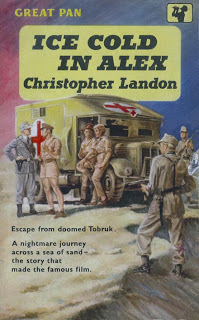It's always an education reading about realistic events portrayed in fictional concoctions, or, sometimes, in classic films, watched over and over again with growing perspectives as I matured into a stale, pale...but not quite dead yet, ladies!...ahem...male. (Dirty word that!)
'Ice Cold In Alex', a novel of 1957 written by Christopher Landon, became one of my favourite Second World War, black-&-white films, starring John Mills, Harry Andrews, Anthony Quayle & Sheila Sims, the male actors, perfect representations of real men who had some backbone during an existential crisis. The three male characters, in both book and film, would no doubt in 2022, be seen as...well...you know the 'woke' definitions of male war heroes, don't you?...so many abusive terms for men these days...from you know where! But the characters in this adventure were every bit the old stereotypes.
It's set during the days following the fall of Tobruk, Libya in 1942; the British forces in North Africa are retreating towards Alexandria, harassed by Afrika Korps tactical skills & the climate, & relates the story of a transport section given the task of taking 2 nurses, stranded in their own hell, away east to safety. The two British soldiers - Captain George Anson & Sgt.Major Tom Pugh - & two nurses, in an ambulance-like vehicle dubbed 'Katy', pick up a stray Afrikaaner/Afrikander?! early in the trek & quickly run into German weaponry, fatally wounding one of the nurses, & bringing out the mental strength of the other, Diana Murdoch.
The Afikaaner, Zimmerman, manages to negotiate with Germans in their native tongue,in two separate confrontations with the enemy, which allows them to pass on.
Suspicions are raised about Zimmerman's true identity by the three British travellers (the wounded nurse has died) until, later in the desert ordeal, it becomes glaringly clear that he is a German spy with a radio transmitter, responsible for keeping tabs on British plans & manoeuvres.
But Zimmerman proves his worth as a tough & immensely strong ally to Captain Anson & Sgt.Pugh & Nurse Murdoch, and the quartet finally have their reward in an Alexandrian bar - glasses of ice-cold pale amber, Rheingold beer (ironic!) & Tom Pugh & Diana Murdoch contemplating a married future, having fallen in love over the past week or so, in such harrowing circumstances. The alcoholic Captain Anson persuades Zimmerman to adopt an alibi to escape a firing squad - he owns up to being Otto Lutz, an officer in the Afrika Korps who has been taken as a prisoner by the two British servicemen. The final scenes of the book, and later the film, are classics, as a good German emerges in both his courage & his humanity, & Lutz accepts that, perhaps, he had been ill-informed about British martial spirits & the joys of an ice-cold beer far from the firing lines of battle.
The film, for obvious reasons, tinkers with some of the books details, but reflects the grim struggle to survive in a hostile environment against all the odds when the human spirit for survival appears, even in sworn enemies.
Given that this adventure story was basically aimed, accurately, at a male readership (now diminishing to a tiny percentage!), I left off a 5th star in my rating, knowing that such novels will offend so many female readers with its portayal of unreformed & chauvinist men...the same men who helped to defeat the Nazi Germans, Fascist Italians & their ubiquitous collaborators in so many of the countries that now make up the European Union. 'nuff said!

